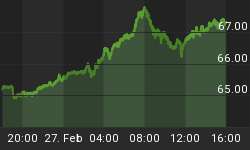Jim O'Neill, chairman of Goldman Sachs Asset Management, spoke with Tom Keene and Sara on "Bloomberg Surveillance" today and said that the Bank of Japan must show it is serious about inflation targeting for the yen to weaken further.
O'Neill said: "We've traveled a long way since late November" and "classical indicators suggest it is oversold." The Bank of Japan "has got to show its going to take this 2 percent inflation target seriously. Rather than just a goal, it has to be a target."
O'Neill on whether there is further to go in yen weakness:
"We traveled a long way since late November. There are some classic indicators suggesting it is a little bit oversold. The next twist is not quite as straightforward of a call. Obviously a huge focus on the BOJ meeting on the 21st and 22nd. In order for us to sustain further movement, the BOJ has to show that it will take this 2% inflation target seriously. Rather than it just being a goal, it has to be a target. And I think it is important that we see continued evidence of the U.S. doing better. I have had this view for a while that the scale of what Japan was thinking about was bigger than what most people realize. That part is now translated. To really get dollar yen north of 100 and higher, we need to sue the other side of it, that the BOJ is serious and that the U.S. is managing to strengthen despite fiscal tightening. Nothing is ever a one-way street, but the basis is very powerful for this story."
On whether central banks can follow up with the policy action that is built into the markets right now:
"Throughout my career a lot of the most important impact of policymakers has just been the statement of the intent, not the size of what they actually do, particularly involves an intervention, is not necessarily the key thing to watch...The scale of what the Japanese policymakers are talking about, particularly in the context of inflation targeting, all you need is people to believe it and off you go."
On the massive move in the Swiss franc yesterday:
"I think linked to the yen weakness there are many collective things starting to come together. I think the decline of the franc is showing there is growing more retail confidence maybe that the European situation is stabilizing in a stronger way than perhaps many people talk about, otherwise it would be hard to understand the franc move. Of course more broadly, the franc for the whole of my career--over 30-odd years if not longer--plays this critical role of being the true test of global risk aversion. The fact that the franc weakening so much in the short space is another sign on top of others that we're seeing a bit of a rotation of investor psychology about the whole fragility of the world or less fragility."
On whether the rotating door in Japanese government diminishes credibility in what Prime Minister Abe actually says to the markets:
"It is a pretty good point. You have to be careful what any political leader says and what the consequences are in terms of doing, but I think the thing that is so intriguing about this, [Abe] comes into power at a time where he can determine the new Bank of Japan governor. They are making it pretty clear that if the BOJ does not ship to his own accord, they will effectively take over the leadership by putting in the person they think is relevant. There have been further comments said about that in the past two days as well. That is why I think many market participants are giving it so much credence, not simply because of the persuasive powers of Abe. The next twist is quite how powerful the BOJ's own decision making path appears after the meeting on the 21st and 22nd. If they play the typical role we have seen in the past where they say we hear you but there is nothing we can do about it, then the markets might have some period of disappointment. I don't think they are going to do that. It seems to me that the pressure they are under...from corporate Japan is much bigger than I can recall in a long, long time."















